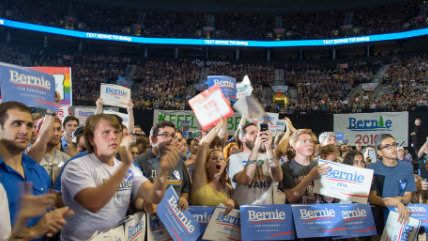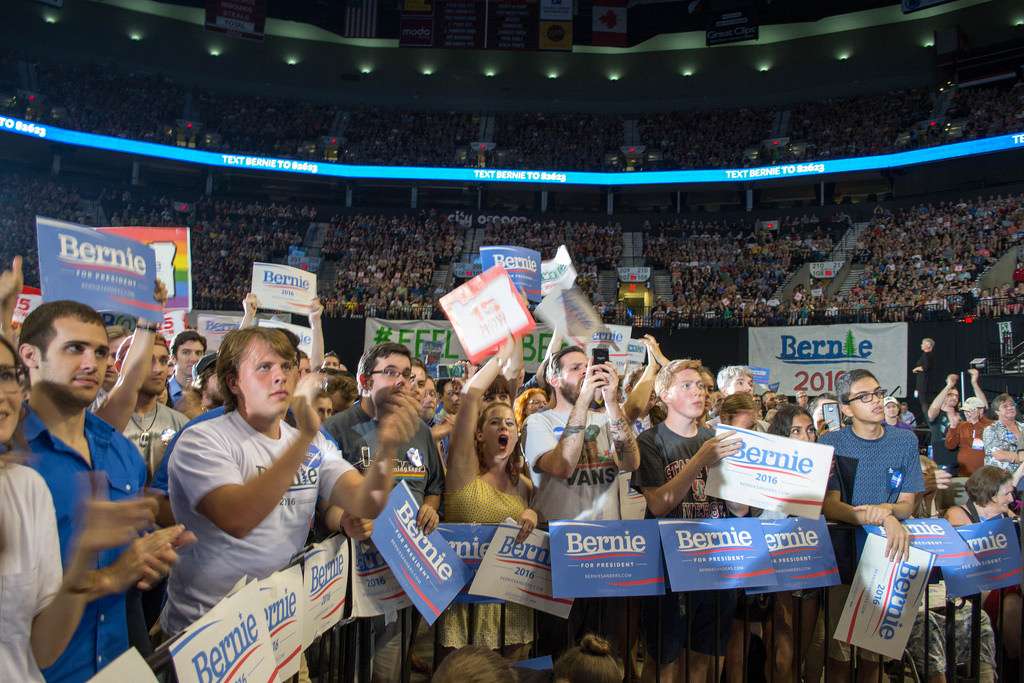In Trump, Sanders, and Pope Francis, a Warning About the Politics of Crowds
All three of these political stars of the moment are drawing big crowds by the dangerous old method of blaming a minority.


The voice I find myself missing this political season is that of Fouad Ajami, who died last year. Not so much for Ajami's insights into the area that was his academic speciality, the Middle East, though one certainly wishes for his thoughts on the Islamic State, the humanitarian disaster that is Syria, and the nuclear sanctions relief deal with Iran. Rather, for the wisdom Ajami displayed back in 2008 in his Wall Street Journal article on the "Politics of Crowds." That newspaper article is nearly seven years old at this point, but the events of this month sent me scrambling to re-read it.
"Hitherto, crowds have not been a prominent feature of American politics. We associate them with the temper of Third World societies," Ajami wrote. "We think of places like Argentina and Egypt and Iran, of multitudes brought together by their zeal for a Peron or a Nasser or a Khomeini. In these kinds of societies, the crowd comes forth to affirm its faith in a redeemer: a man who would set the world right."
He wrote, "the tragedy of Arab political culture has been the unending expectation of the crowd—the street, we call it—in the redeemer who will put an end to the decline, who will restore faded splendor and greatness." Ajami did not mention, in that particular article, Germany of the 1930s. But to readers with even a casual knowledge of 20th century European history, that, too, is a cautionary example of crowds massing to support a redeemer promising to restore greatness.
To be sure, there are counterexamples, when crowds were constructive, or when a politician really did restore greatness. There one thinks of the Boston Tea Party, or the March on Washington for civil rights, or the presidency of Ronald Reagan. What makes a crowd dangerous is a focus on a scapegoat, a vulnerable minority that can be blamed for all the problems.
Which brings us to 2015, and to the redeemer-politicians drawing large crowds. There are three of them: Donald Trump, Bernie Sanders, and Pope Francis. None of their fans will be happy about my comparing them to Hitler, Nasser, or Khomeini, so let me be clear—I don't doubt their genuine good intentions. Donald Trump seems genuinely to love America and want to restore it to greatness. Bernie Sanders seems genuinely to want to improve the lives of Americans struggling with medical bills, student debt, or low wages. Pope Francis seems genuinely to care about and want to help the poor. The pontiff also to wants to protect the earth's environment.
But intentions aside, all three of these political stars of the moment are drawing big crowds by the dangerous old method of blaming a minority. And the hopes invested in all three are bound to be disappointed.
Trump blames Mexican immigrants who can't even vote. Sanders blames what he calls "the billionaire class," a class whose purported vast influence doesn't seem to have done anything to prevent Sanders' own formidable political rise. The pope blames the bankers, denouncing "usury" and what he called "oppressive lending systems which, far from promoting progress, subject people to mechanisms which generate greater poverty, exclusion and dependence."
Trump's policy proposals—abrogating free trade agreements, raising marginal tax rates on the most economically productive Americans—are unlikely to lead to a restoration of American greatness and in fact are likely only to accelerate a national decline. Sanders' policy proposals—increased taxing, spending, and regulating—are also unlikely to lead to a restoration of American greatness. They are more likely to send America down the path of a Europe-style socialist decline, with high unemployment, slow growth, and less technological innovation. And the pope's policy proposals, on reforming capitalism and countering global warming, are themselves unlikely to help either the poor or the environment.
Michael Grunwald, who is not exactly a right-wing ideologue, made the environment point in a Politico piece headlined, "Why the Pope is wrong about climate."
The pope isn't a big fan of the profit motive, but it's the best hope for bringing clean-tech products to the masses. It's what inspired firms like Solar City and SunRun to offer no-money-down leases for rooftop solar panels. It's what's inspiring Wall Street to securitize those leases for investors, which will pour more money into the solar industry and further drive down costs. Elon Musk hopes to change the world, but Tesla wouldn't have a prayer of reinventing transportation (and now grid storage as well) without investors who hope to make a buck.
(..) Pope Francis writes about the dangers of excessive growth, which 'leads to the planet being squeezed dry beyond every limit,' but economic growth usually produces better environmental protection, which often seems to be a luxury poor countries can't afford."
Where's the politician who can draw a crowd for an optimistic vision of American capitalism, growth, and technological progress? The supporters of such a vision may not have time to go to papal parades or political rallies because they are too busy working, creating, or taking care of families. Let's hope they aren't too busy to vote.
